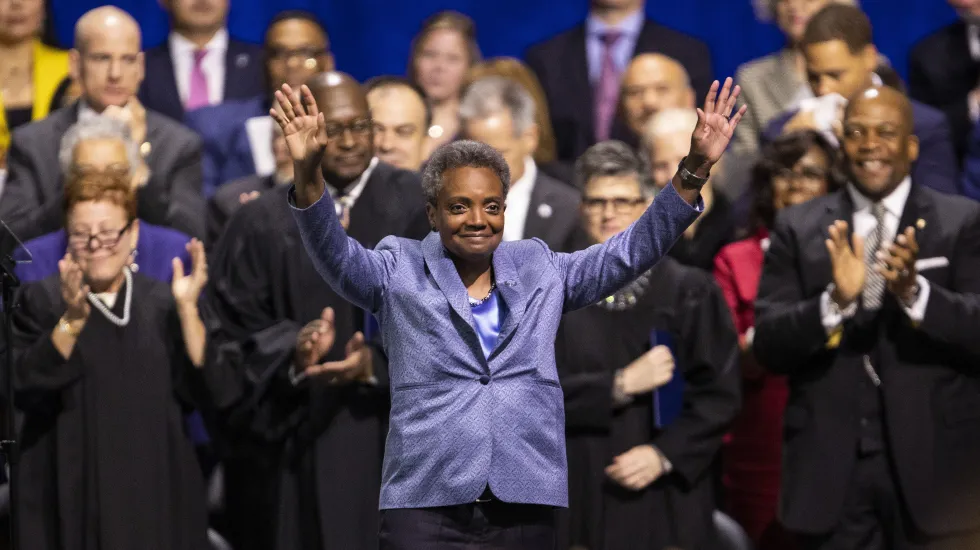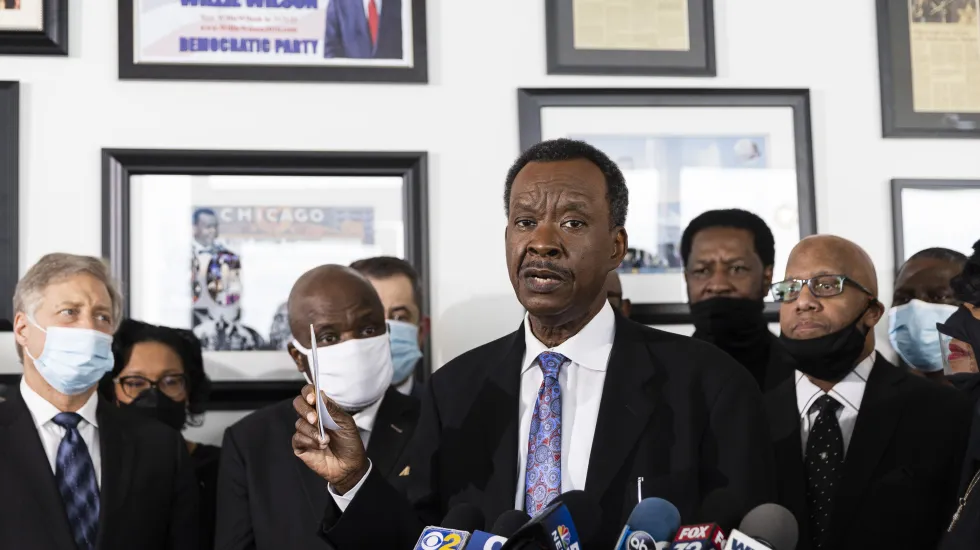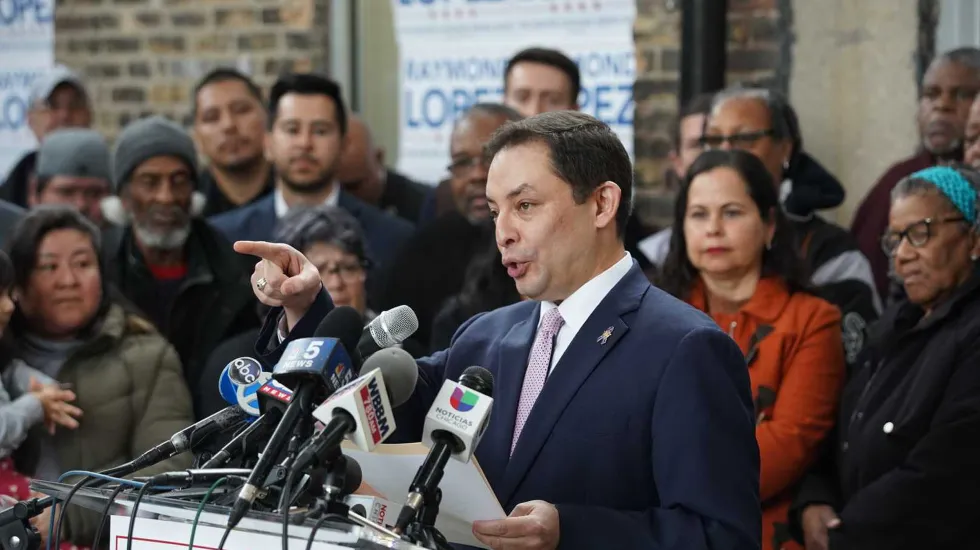
Two blue-chip candidates have now decided not to run for mayor against an unpopular incumbent in a race that, every poll shows, is winnable.
That raises at least three questions: Why take a pass? Who is helped? And for how long?
“It helps the player to be named later,” said Peter Giangreco, the veteran political strategist whose client U.S. Rep. Mike Quigley (D-Chicago) on Thursday joined former U.S. Education Secretary Arne Duncan in taking a pass on the race against incumbent Mayor Lori Lightfoot.
Analysis
“There are gonna be a lot of people who are gonna look towards Business Leadership Council kinds of folks. Is there a Marty Nesbitt? Is there a John Rogers? Is there somebody like that who can run and win?”
Yet another political operative, who asked to remain anonymous, agreed, claiming Chicago is “in too dire of a strait” for Lightfoot to “get a pass.”
“This is gonna be a real fistfight. The person likely to win isn’t in the race right now,” the operative said.
Lightfoot on Thursday told the Sun-Times she will soon announce she’s officially seeking a second term. But, the operative noted: “Look at those polls. The money’s not exactly coming in hand over fist. A lot of people give her money just because they have to to protect their interests.”
Veteran political operative Victor Reyes begged to differ. He argued Quigley’s decision to opt out “helps Lightfoot by default” and will certainly boost her lagging fundraising.
Lightfoot has just $1.7 million in her primary political account. Chicago’s big money interests remain on the sidelines, waiting for a candidate.
“The list is short. It’s getting shorter. If top-tier candidates aren’t willing to run, that helps an incumbent for sure. By default, it helps her,” Reyes said.

Ald. Brian Hopkins (2nd), mulling his own race for mayor, said Quigley “would have been a strong candidate.” Without him in the race, Lightfoot may have an easier time trying to reclaim the lakefront voters who propelled her to a first-place finish in the first round in 2019.
“To some degree, any time a potentially viable candidate is considering it, then chooses not to, certainly that helps her because she can say nobody wants to take her on,” Hopkins said.
So far, the only declared candidates are Ald. Ray Lopez (15th) and millionaire businessman Willie Wilson. Former Chicago Public Schools CEO Paul Vallas has said he will decide by Memorial Day whether to run.
Quigley would have been a formidable contender.
He is a political centrist with a progressive bent from a North Side ward. He got his start in politics as a top aide to then-Ald. Bernard Hansen (44th) during the battle over lights at Wrigley Field. After a stint on the Cook County Board, he landed in Rahm Emanuel’s congressional seat after Emanuel became chief of staff to President Barack Obama.
Quigley’s high name recognition only increased since Russia’s invasion of Ukraine. In a statement announcing his decision not to run, Quigley said he “simply cannot walk away from my duty to safeguard democracy, fight for American values abroad and stand up for the brave Ukrainian people in their time of maximum peril.”
Campaigning for mayor simply “would not allow me to fulfill this critical obligation,” he said.
“The great city I love faces unprecedented challenges on crime, schools, equity and fiscal matters that demand 100% full-time commitment from our mayor. At age 53, I would have relished the opportunity to get Chicago back on track. If I’m being completely honest, at 63, I don’t think my family and I can make this kind of commitment,” Quigley was quoted as saying.
Quigley’s statement begs the original question: Did Chicago’s problems with crime, education, pensions, finances and poverty discourage Duncan and Quigley?
“There’s a sense that the problems are intractable,” Reyes said.
Former Ald. Pat O’Connor (40th), City Council floor leader under former Mayors Richard M. Daley and Rahm Emanuel, agreed.
“The problems that the next mayor of Chicago faces are of such a magnitude that you really have to be willing to pretty much give up four years of your life in terms of having a personal life to address those problems. At this point in their careers, they’ve decided that’s a sacrifice that’s not necessary. They feel they’re doing good work where they’re at,” O’Connor said of Quigley and Duncan.

Better Government Association President and CEO David Greising characterized the job as “difficult, but not impossible.” He does not believe Duncan and Quigley were “scared away” by those problems.
“Rahm Emanuel — whether you were a fan or his work or not — was pretty effective as mayor. He got things done. He had a difficult personality in a different way [than Lightfoot]. But he still knew how to get to yes with enough people … to get things done,” Greising said.
“I’ve not heard anyone say, ‘This job is impossible and there’s no one on earth who can do it.’ It is a really tough one, though. And there are few people on earth who can do it well.”
Yet another discouraging factor is the diminishing power of the mayor’s office.
Chicago’s mayor will still wear the jacket for Chicago Public Schools. But a Chicago Teachers Union with expanded bargaining rights and 21-member elected school board — both approved by the Illinois General Assembly over Lightfoot’s objections — will make it more difficult, if not impossible, for the mayor to make the changes voters demand.
The same goes for violent crime and the Chicago Police Department, which is getting a seven-member civilian oversight commission with the power to initiate police policy and take votes of no-confidence in the police superintendent, chief administrator of the Civilian Office of Police Accountability and any Police Board member.
“The mayor doesn’t have the power to fix things like they used to. And when you start looking at other cities like Seattle, Portland, Minneapolis, you’ve got a string of one-term mayors. You’re getting to a situation where it’s almost ungovernable,” Giangreco said.
“The perceived inability to fix crime is what’s driving the whole thing. When Rich Daley ran in ’89, it was all about crime because you couldn’t really fix the schools, do economic development or anything else until you dealt with crime. And we’re kind of back to that spot.”

Recent polls conducted by other declared and potential mayoral candidates and for the City Council’s Black and Hispanic Caucuses show Lightfoot facing an uphill re-election battle, with a public approval rating below 30%.
Before pulling the plug, Quigley did a citywide poll showing what he called “a clear path to a runoff,” with him defeating Lightfoot by a landslide in Round 2.
“He beats her by 10 points in a runoff. And getting 15-to-20% of the Black vote in the process. That tells you a lot ... about where the mayor is,” Giangreco said.
Christina Freudlich, a spokesperson for the Lightfoot campaign, sees things a little differently.
“If they’re looking at the polling and they’re not jumping in, clearly there is something that is scaring them,” Freudlich said.
“Mayor Lightfoot has always been underestimated. She was in her last campaign. She has throughout her time as mayor. Everyone can talk the talk about how they want to run against her. But they’re not willing to step up and do it. They’re seeing the strong support she has and what they’re gonna have to run up against.”
Whatever discouraged Quigley and Duncan from running, it left a gigantic void in the race for mayor that’s still waiting to be filled.
What remains unclear is, will that void be filled, or will the same discouraging factors pave the way for an unpopular mayor to avoid becoming a one-termer?







